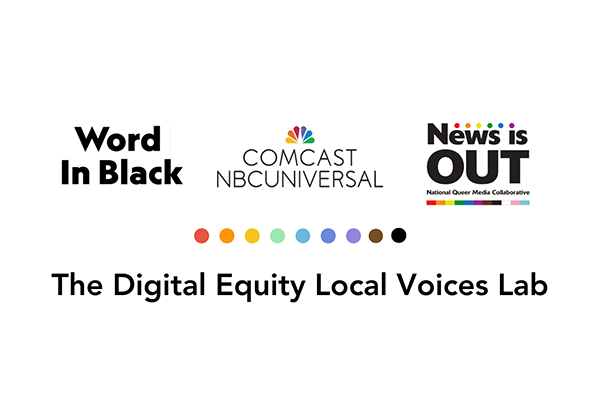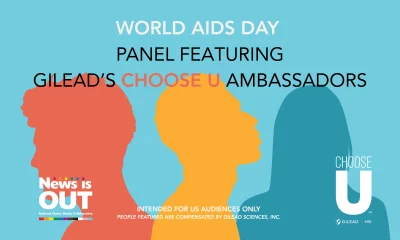News
Comcast NBCUniversal Partners with News is Out and Word In Black to Launch Fellowship Program that Highlights Black and LGBTQ+ Issues
Digital Equity Local Voices Lab Fellows to be Placed at 16 Local Publications to Receive Training and Create Content

News is Out, a queer media collaborative of six of the nation’s legendary LGBTQ+ publications, and Word In Black, a collaborative of ten of the nation’s legendary Black publishers, are joining Comcast NBCUniversal for a groundbreaking initiative: The Digital Equity Local Voices Lab. Through Project UP, Comcast’s $1 billion commitment to advance digital equity and economic opportunities, the company is donating more than $1 million to launch this first-of-its-kind Lab that supports coverage of Black and LGBTQ+- topics in the media and supports emerging journalists with a passion for reporting on issues of importance to these communities.
Together, the three organizations will work to shed light on issues within marginalized communities across 16 news publications with the training and resources needed to tell these stories through media and technology and celebrate the work being done by Black and LGBTQ+ leaders in their communities.
“Word In Black is looking forward to working with our colleagues at News is Out and Comcast NBCUniversal on this groundbreaking fellowship program,” said Chris Bennett, publisher of the Seattle Medium and member of the Word In Black collaboration. “Uplifting the voices of journalists and publishers who are dedicated to covering Black and LGBTQ+ stories is vital to the future of inclusive media.”
Specifically, the Lab will elevate Black and LGBTQ+ perspectives through content creation and content sharing with NBCUniversal and NBCU Academy during a year-long fellowship program that places 16 fellows at the 16 participating news organizations.
Fellows will be part of a cohort that receives best practices and learnings from journalists and media professionals at News is Out, Word In Black, and NBCUniversal. They will also report on stories of Black and LGBTQ+ entrepreneurs and creatives in their communities, share training and resources on using technology more in their daily lives, report on policy related to access to technology and connectivity, and share the work being done to advance digital equity.
“As a Black queer woman, I know the impact of empowering and elevating Black and LGBTQ+ voices,” said Eboné F. Bell, publisher of Tagg Magazine. “This project gives us an opportunity to instill a great amount of knowledge and experience in fellows who can help amplify the voice of these communities in the media industry.”
The Local Media Foundation (LMF) will manage the fellowship and Lab and facilitate content creation to reach diverse audiences between the 16 publishers and Comcast NBCUniversal. Word In Black and News is Out are collaboratives that were launched by LMF.
“Comcast is proud to launch this important initiative with the Local Media Foundation, News is Out, and Word In Black to empower a new generation of journalists and media professionals ” said Anzio Williams, SVP of Diversity, Equity, and Inclusion at NBCUniversal Local. “Ensuring that the stories and perspectives of underrepresentedcommunities are featured in the media by dedicated, trained and resourced journalists is at the heart of Project UP’s and NBCU Academy’s mission. We look forward to seeing these journalists grow in their career and influence.”
Applications are open to anyone with a passion for covering communities of color and/or LGBTQ+ issues. To learn more and apply, visit this link.
The 16 participating publications are:
- AFRO News (Baltimore): Founded in 1892,AFRO provides readers with good news about the Black community not otherwise found. The AFRO and its talented team of journalists have won numerous awards, including NNPA newspaper of the year in 2022, and was named the Nation’s # 1 African American Newspaper by Essence-Nielsen Consumer Survey.
- The Atlanta Voice(Atlanta):The Atlanta Voice has been serving the metropolitan Atlanta community for more than 58 years. Birthed out of the Civil Rights movement as a trusted, authentic, fact and community driven media outlet for Black Atlanta. The publication’s motto is “A People Without A Voice Cannot be Heard”.
- Bay Area Reporter (San Francisco): Launched in 1971, this weekly newspaper is one of the oldest and a pioneer in LGBTQ+ media.
- Dallas Voice (Dallas): The premier media source for LGBTQ Texas, publishing every Friday since 1984.
- Dallas Weekly (Dallas): Since 1954, Dallas Weekly has been at the epicenter of all things African American in north Texas, one of the country’s fastest-growing regions.
- Houston Defender (Houston): Since 1930, the Houston Defender Network has been “Raising Black Voices” as we Educate, Entertain and Empower the Greater Houston Black Community.
- Michigan Chronicle (Detroit) The Michigan Chronicle is a news, information, and events company that covers the interests of the African American community. Leaders and readers in metropolitan Detroit look to the Michigan Chronicle to stay informed about issues that impact their lives.
- New York Amsterdam News (New York City): Started more than a century ago, with a $10 investment, New York Amsterdam News has gone on to become one of the most important Black newspapers in the country and today remains one of the most influential Black-owned and -operated media businesses in the nation, if not the world.
- Philadelphia Gay News (Philadelphia): The largest and oldest publication targeting the LGBTQ+ community, started in 1976.
- The Sacramento Observer (Sacramento): Established in 1962, The Sacramento Observer has been one of the most decorated publications in the history of the Black Press.
- Seattle Medium (Seattle): Founded on January 15, 1970, The Seattle Medium is the flagship publication of Tiloben Publishing Co., Inc. – the largest minority-owned and operated communications company in the Pacific Northwest, serving the Seattle, Tacoma and Portland Markets – and is the primary source of news that residents of Seattle read to stay informed regarding issues and events that affect and enhance the quality of life in African American community.
- The St. Louis American (St. Louis):Since 1928, The St. Louis American newspaper remains Black-owned and has emergedas the leading, most trusted voice of the area’s African American community.
- Tagg Magazine (National): This award-winning and Black queer, woman-owned publication, founded in 2012, is committed to uplifting the voices of all LGBTQ+ women across the country. Tagg was created to serve “everything lesbian, queer, and under the rainbow.”
- Washington Blade (Washington, D.C.): This weekly publication is the oldest LGBTQ+ newspaper in the U.S. It was launched in 1969.
- The Washington Informer (Washington, D.C.): Founded the paper in 1964, this weekly, women-owned media company serves as the link to the African American community in the D.C. metropolitan area.
- Windy City Times (Chicago): Founded in 1985, this legacy LGBTQ+ newspaper and website covers Chicago and its suburbs.

Texas state Rep. James Talarico won a hard-fought primary Tuesday to become the state’s Democratic nominee for U.S. Senate, defeating U.S. Rep. Jasmine Crockett in one of the year’s most closely watched and competitive Democratic contests.
Talarico, a Presbyterian seminarian and three-term lawmaker from Round Rock, was declared the winner by the Associated Press early Wednesday morning after a closely tracked vote count that drew national attention.
“Tonight, the people of our state gave this country a little bit of hope,” Talarico told the AP. “And a little bit of hope is a dangerous thing.”
With 52.8% of the vote to Crockett’s 45.9%, Talarico secured the nomination outright, avoiding a runoff and capping months of sharp contrasts between the two candidates over strategy, messaging, and how best to compete statewide in Texas. Democrats hope the competitive primary — and the relatively narrow margin — signals growing momentum in a state that has not elected a Democrat to the U.S. Senate since 1988.
Talarico has long expressed support for the LGBTQ community, a position he highlights prominently on his campaign website. Under the “Issues” section, he directly addresses assumptions that might arise from his faith and background as a seminarian in a deeply conservative state.
“My faith in Jesus leads me to reject Christian Nationalism and commit myself to the project of democracy,” his website reads. “Because that’s the promise of America: a democracy where every person and every family — regardless of religion, race, gender, sexual orientation, or any other difference between us — can truly be free and live up to their full potential.”
Crockett struck a conciliatory tone following her defeat, emphasizing party unity ahead of November.
“This morning I called James and congratulated him on becoming the Senate nominee,” Crockett told Politico. “Texas is primed to turn blue and we must remain united because this is bigger than any one person. This is about the future of all 30 million Texans and getting America back on track.”
Talarico also drew national attention earlier in the race when “Late Show” host Stephen Colbert said he was initially unable to air an interview with the state legislator due to potential FCC concerns involving CBS. The episode sparked a broader political debate.
Brendan Carr, chair of the Federal Communications Commission, appointed by President Donald Trump, told reporters the controversy was a “hoax,” though he also acknowledged Talarico’s ability to harness the moment to build support as an underdog candidate. The interview was later released online and garnered millions of views, boosting Talarico’s national profile.
In November, Talarico will face the winner of the Republican primary between incumbent Sen. John Cornyn and Texas Attorney General Ken Paxton, who have been locked in a bruising GOP contest. Rep. Wesley Hunt was also in the Republican primary field. The GOP race is expected to head to a May runoff.
In a joint statement, Senate Minority Leader Chuck Schumer and Democratic Senatorial Campaign Committee Chair Kirsten Gillibrand praised Talarico’s victory and framed him as a candidate capable of broad appeal.
“As an eighth-generation Texan, former middle school teacher, and Presbyterian seminarian, James will be a fighter for Texans from all walks of life and of all political stripes,” they said. “In November, Texans will elect a champion for working people: James Talarico.”
Maryland
Md. Commission on LGBTQIA+ Affairs released updated student recommendations
LGBTQ students report higher rates of bullying, suicide

The Maryland Commission on LGBTQIA+ Affairs has released updated recommendations on how the state’s schools can support LGBTQ students.
The updated 16-page document outlines eight “actionable recommendations” for Maryland schools, supplemented with data and links to additional resources. The recommendations are:
- Developing and passing a uniform statewide and comprehensive policy aimed at protecting “transgender, nonbinary, and gender expansive students” against discrimination. The recommendation lists minimum requirements for the policy to address: name, pronoun usage, and restroom access.
- Requiring all educators to receive training about the specific needs of LGBTQ students, by trained facilitators. The training’s “core competencies” include instruction on terminology, data, and support for students.
- Implementing LGBTQ-inclusive curricula and preventing book bans. The report highlights a “comprehensive sexual education curriculum” as specifically important in the overall education curriculum. It also states the curriculum will “provide all students with life-saving information about how to protect themselves and others in sexual and romantic situations.”
- Establishing Gender Sexuality Alliances “at all schools and in all grade levels.” This recommendation includes measures on how to adequately establish effective GSAs, such as campaign advertising, and official state resources that outline how to establish and maintain a GSA.
- Providing resources to students’ family members and supporters. This recommendation proposes partnering with local education agencies to provide “culturally responsive, LGBTQIA+ affirming family engagement initiatives.”
- Collecting statewide data on LGBTQ youth. The data on Maryland’s LGBTQ youth population is sparse and non-exhaustive, and this recommendation seeks to collect information to inform policy and programming across the state for LGBTQ youth.
- Hiring a full-time team at the Maryland Department of Education that focuses on LGBTQ student achievement. These employees would have specific duties that include “advising on local and state, and federal policy” as well as developing the LGBTQ curriculum, and organizing the data and family resources.
- Promoting and ensuring awareness of the 2024 guidelines to support LGBTQ students.
The commission has 21 members, with elections every year, and open volunteer positions. It was created in 2021 and amended in 2023 to add more members.
The Governor’s Office of Communication says the commission’s goal is “to serve LGBTQIA+ Marylanders by galvanizing community voices, researching and addressing challenges, and advocating for policies to advance equity and inclusion.”
The commission is tasked with coming up with yearly recommendations. This year’s aim “to ensure that every child can learn in a safe, inclusive, and supportive environment.”
The Human Rights Campaign’s most recent report on LGBTQ youth revealed that 46.1 percent of LGBTQ youth felt unsafe in some school settings. Those numbers are higher for transgender students, with 54.9 percent of them saying they feel unsafe in school.
Maryland’s High School Youth Risk Behavior Survey reveals a disparity in mental health issues and concerns among students who identify as LGBTQ, compared to those who are heterosexual. LGBTQ students report higher rates of bullying, feelings of hopelessness, and suicidal thoughts. Nearly 36 percent of LGBTQ students report they have a suicide plan, and 26.7 percent of respondents say they have attempted to die by suicide.
The commission’s recommendations seek to combat the mental health crisis among the state’s LGBTQ students. They are also a call for local and state governments to work towards implementing them.
Virginia
Va. lawmakers consider partial restoration of Ryan White funds
State Department of Health in 2025 cut $20 million from Part B program

The Virginia General Assembly is considering the partial restoration of HIV funding that the state’s Department of Health cut last year.
The Department of Health in 2025 cut $20 million — or 67 percent of total funding — from the Ryan White Part B program.
The funding cuts started with the Trump-Vance administration passing budget cuts to federal HIV screening and protection programs. Rebate issues between the Virginia Department of Health and the company that provides HIV medications began.
Advocates say the funding cuts have disproportionately impacted lower-income people.
The Ryan White HIV/AIDS Program, a federal program started in 1990, provides medical services, public education, and essential services. Part B offers 21 services, seven of which remained funded after the budget cuts.
Equality Virginia notes “in 2025, a 67 percent reduction severely destabilized HIV services across the commonwealth.”
Virginia lawmakers have approved two bills — House Bill 30 and Senate Bill 30 — that would partially restore the funding. The Ryan White cuts remain a concern among community members.
Both chambers of the General Assembly must review their proposed changes before lawmakers can adopt the bills.
“While these amendments aren’t a full restoration of what community-based organizations lost, this marks a critical step toward stabilizing care for thousands of Virginians living with HIV,” said Equality Virginia Executive Director Narissa Rahaman. “Equality Virginia plans to continue their contact with lawmakers and delegates through the conference and up until the passing of the budget.”
“We appreciate lawmakers from both sides of the aisle who recognized the urgency of this moment and will work to ensure funding remains in the final version signed by the governor,” added Rahaman.




















